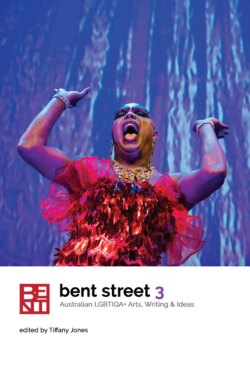Читать книгу Bent Street 3 - Tiffany Jones - Страница 11
На сайте Литреса книга снята с продажи.
InsideOUT PETER WAPLES-CROWE
ОглавлениеWhy am I constantly on the outside? I’m so familiar with that position that it’s my go to, my stable, the way I see the world. I’m on the outside of the queer community because of my Ngarigo identity and I’m on the outside of the Aboriginal and Torres Strait Islander community because I’m queer. The Elders, from my experience, really hate the word Queer, because it has so many negative connotations for older people; but I’m really comfortable calling myself a queer Koori. I used to say gay but maybe gay is too soft or something. My thinking is queer and broader than just gay.
I’m also a Ngarigo person, not a Ngarigo man, that’s all way too binary I feel now, and I need to be opening space up in the Community for trans- people and non-binary mob. We have a pretty rigid tradition of Men’s Business and Women’s Business and we need to make room. Cultures change and shift with time, they are not static things and maybe we need some new thinking around old modes of culture to create more space for the new.
InsideOUT is the name of a short documentary and the name of a solo art show that ran in May 2019 at the Koorie Heritage Trust in Melbourne, and some of my prints were displayed at the Original BOX show at Boomalli Art Gallery for the Mardi Gras in Sydney.
InsideOUT is the perfect title for me and really sums up my life in 2019. My art is from my inside, my livingness; but I’m very queer out and proud. I was adopted into a white family at birth and my journey back to my Ngarigo was from the outside to coming IN to the Community. That journey was made harder because I was queer, and it was already very tough and distressing at times. I thought it would be some linkup fantasy but no, it took me close to 25 years to find my connections in a real way and to settle my spirit. I was too busy being a queen really for the first part of my life in the AIDS era, which was enough for anyone to deal with. My Aboriginal journey came later and I’m so glad I survived both experiences and am strong and deadly today. I have my ancestors with me that’s for sure. I’m so bloody lucky for that, but I do try to keep them close these days.
I’m known as Ngurran in my tribe which is the emu. And it a very apt animal for me because it bends the gender roles, with the male emu sitting on the eggs and raising the chicks. My Uncle gave me this name after he had a vision of an Emu sitting on a nest of eggs and carved on the eggs were pictures of Dingos. I think I really wanted the dingo as my name originally and was disappointed that I got the emu because I have painted mirrigang (wild dogs) all my life really and feel a close spiritual connection to all wild dogs. The dingo has come into focus in my art in recent years because I love using symbols, and to me the dingo is a marginalised native animal that in most parts of Australia is not protected, so it’s become a queer person emblem. I’m a queer native and not afforded all the same rights as the rest of the natives. Like the dingo I am seen, by some, as a ‘pest’ and a ‘nuisance’ and I can be attacked or hunted, like the dingo is, by farmers who see it as a threat to their livelihood or their ‘progress’.
Colonisation has not been kind to the dingo and it hasn’t been kind to me and my people either.
I like that I am Ngurran and I love my Uncle’s vision of me in the end. All I ever wanted was a place in the tribe. I love that I am a queer Ngarigo person and that our Country is the high snow Country and that we are the snow or ice people. I try to visit my Country when I can and this year I attended a small workshop about our language (Ngarigu), and who knows how it will influence my art and my life?
My journey back to country has been a long and often difficult one and home is not without its trauma; but I’m glad I am where I am and I look forward to learning more. I still feel my queerness puts me on the outside and I know other Aboriginal queer people who are not welcome in their tribes because of it. My partner has never come with me to meet my tribe so I guess that will be a test if it ever happens.
Alone I can dip in and out of Country but I still sometimes feel unsafe there. The last time I went back I heard lots of traumatic stories and it made me glad I don’t live there all the time. I just don’t need that, but I know my cousins are there on country representing me. I stay in touch over Facebook and keep track of people. I’m still like the Dingo, sometimes I want to be hanging with the Mob and other times I need my own space. I’m inside my tribe and I’m OUT, but it’s still a balancing act.
